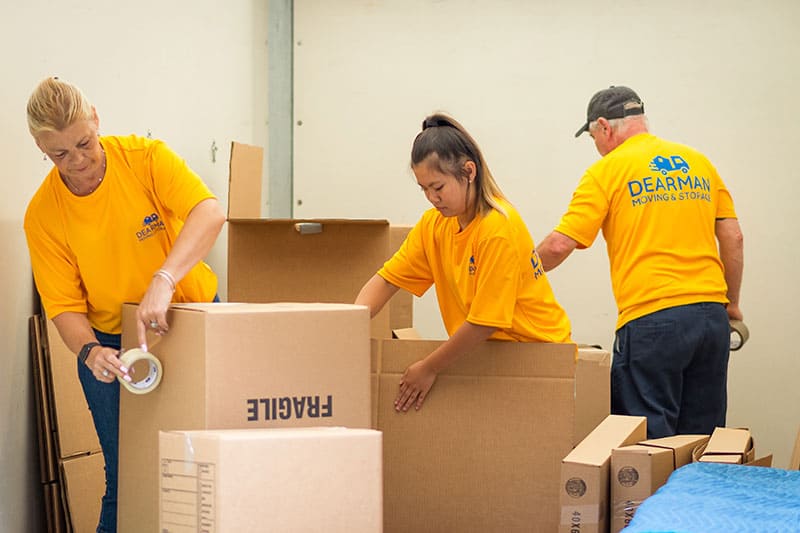5 essential tips for maintaining on-time international shipping delivery
Recognizing the Inclusions of moving and Freight Forwarding in the World of Global and residential Delivery
Steering via the complexities of moving and Freight forwarding can be tough. Both processes include distinctive treatments and requirements that are vital for successful transport. Comprehending the differences in logistics, paperwork, and threat administration is crucial for individuals and companies alike. This knowledge can greatly affect the efficiency and security of shipments. Numerous are unaware of the particular elements that affect the general experience and end results. What aspects should one take into consideration to guarantee a smooth transition?
The Basics of moving and Freight Forwarding
moving and Freight forwarding are basic components of the worldwide logistics market. They assist in the transfer of items and individual items throughout domestic and international boundaries. moving primarily involves the moving of households or individuals, including business and property requirements. It commonly consists of packing, loading, carrying, and unboxing items at the location. In contrast, Freight forwarding is concentrated on the shipment of goods, often in bulk, utilizing numerous transportation settings, such as sea, land.freight, or air forwarders function as intermediaries, collaborating logistics to guarantee prompt delivery while navigating with facility laws and custom-mades treatments. Both processes require mindful planning, company, and communication to ensure effectiveness and minimize disturbances. Comprehending these basics is vital for any individual associated with logistics, as they lay the groundwork for advanced facets of delivery and transport management.
Key Components of Freight Forwarding Providers
Freight forwarding services incorporate numerous critical parts that ensure smooth transport of products. Trick duties of Freight forwarders consist of taking care of logistics, coordinating deliveries, and taking care of personalizeds clearance. In addition, recognizing essential delivery documentation is imperative for compliance and reliable activity of freight.
Freight Forwarder Responsibilities
A trustworthy Freight forwarder plays an important function in coordinating the transport of goods, guaranteeing that deliveries are taken care of efficiently and in compliance with guidelines. Their responsibilities include different key jobs, consisting of selecting ideal transportation paths, negotiating Freight rates, and managing logistics. They function as intermediaries in between carriers and providers, making sure that cargo is properly packaged and classified for safe transit. Furthermore, Freight forwarders track shipments, giving updates to customers concerning the standing and anticipated distribution times. They additionally analyze and take care of risks related to transport, advising insurance alternatives as needed. By helping with interaction and documentation, Freight forwarders streamline the shipping procedure, decreasing possible hold-ups and enhancing overall supply chain effectiveness.
Delivering Documents Fundamentals

Understanding Personalizeds Clearance and Documentation
Accurate paperwork is crucial in the personalizeds clearance process, as it assures compliance with various guidelines. A summary of custom-mades regulations highlights the complexities faced by carriers and Freight forwarders. Typical clearance difficulties can substantially influence delivery timelines and prices, making understanding this aspect vital for efficient logistics.
Value of Accurate Documents
Guiding with the intricacies of international delivery requires a keen understanding of customs clearance and the vital function of documentation. Precise paperwork is necessary for making sure that shipments abide by policies and reach their destinations without delays. Correctly prepared documents, consisting of costs of lading, industrial invoices, and packaging listings, help with smooth interactions with customizeds authorities. Errors can cause delivery hold-ups, fines, and even confiscation of goods. In addition, complete documentation aids in tracking deliveries and solving disputes. Companies involved in moving and Freight forwarding should prioritize meticulous paperwork techniques to navigate the elaborate landscape of international delivery successfully. This diligence not just streamlines operations but also enhances consumer complete satisfaction by making certain prompt shipment.
Customs Laws Review
Steering custom-mades regulations is a crucial facet of global trade that straight affects the success of moving and Freight forwarding operations. Effective customs clearance needs an understanding of different guidelines, including tolls, obligations, and import/export restrictions. Accurate documentation is necessary, as it assures compliance with lawful needs and promotes the reliable movement of goods across borders. Secret papers often consist of industrial billings, packaging checklists, and costs of lading, which give thorough details concerning the delivery. In addition, custom-mades brokers play an important function in guiding complicated regulations, working as middlemans between customs and carriers authorities. By keeping complete expertise of customizeds processes, companies can greatly reduce delays and reduce costs linked with global shipping.
Typical Clearance Challenges
Countless challenges can occur during the customizeds clearance process, frequently making complex the movement of products across boundaries. One considerable concern is insufficient documents, which can result in delays and penalties. Importers and exporters have to ensure all called for documents, such as billings, packing checklists, and certifications of origin, is total and exact. Furthermore, disparities in valuation can cause examination from personalizeds authorities, leading to additional obligations or evaluations. Language obstacles might likewise posture difficulties, as miscommunication can lead to misconceptions regarding laws. In addition, modifications in personalizeds policies can develop confusion, requiring constant caution by shippers. Ultimately, getting rid of these clearance challenges calls for comprehensive prep work and a clear understanding of personalizeds demands to assist in smooth international purchases.
Packaging and Classifying Needs
Although commonly overlooked, packaging and labeling demands play a crucial role in the delivery procedure, guaranteeing that products are secured and easily recognizable throughout their trip. Correct packaging safeguards things from damages during transportation, while likewise assisting in effective handling and storage. Using appropriate materials, such as bubble wrap, foam, or tough boxes, can stop breakage and loss.Labeling is similarly important. Clear and exact labels convey crucial details, consisting of the location, dealing with instructions, and materials. Tags should comply with regulations details to residential and worldwide delivery, which might include unsafe products identification or customs declarations.Moreover, standard labeling practices streamline the tracking process and enhance general logistics efficiency. By adhering to packaging and labeling needs, companies minimize the threat of delays, damages, or misdelivery. Inevitably, these techniques contribute substantially to the success of moving and Freight forwarding operations, guaranteeing a smooth shipping experience for all celebrations involved
Tracking Shipments: Importance and Methods
Reliable packaging and labeling established the structure for successful delivery management, yet tracking shipments is similarly vital in the shipping process. Shipment tracking provides real-time visibility, which helps services and consumers keep track of the development of their items. This transparency improves customer contentment, because customers can remain informed regarding distribution timelines and any type of prospective delays.Several approaches facilitate reliable monitoring. Barcode scanning is an usual technique, utilizing unique identifiers to check plans throughout their trip. Additionally, GPS technology allows exact place tracking, enabling for timely updates look at this website and improved logistics administration. Several delivery firms currently offer electronic systems and mobile applications that give individuals with simple accessibility to tracking information.The value of delivery monitoring can not be overemphasized; it minimizes the risk of shed or damaged products, boosts functional effectiveness, and promotes depend on between recipients and shippers. As a result, integrating effective monitoring techniques is vital for successful residential and international delivery procedures.
Insurance policy Options for Your Item

Safeguarding insurance policy for products in transit is an essential consideration for people and companies alike. Insurance policy choices vary based on the sort of shipment, worth of products, and specific risks included. Usual kinds include provider obligation, which covers loss or damages while en route, and full-value insurance policy, giving considerable protection for the complete value of the goods.Shippers may also take into consideration marine insurance policy for worldwide deliveries, safeguarding against threats connected with sea transport. It is vital to analyze the details demands of the delivery and review the conditions of any policy.Furthermore, comprehending exemptions and constraints is vital to stay clear of prospective voids in coverage. Shippers ought to involve with insurance professionals to discover customized options that fit their unique circumstances. Inevitably, purchasing the ideal insurance policy can mitigate monetary dangers and provide satisfaction during the delivery procedure.
Selecting the Right moving and Freight Forwarding Solution
When choosing a relocating and Freight forwarding solution, it is crucial for companies and people to carefully review their certain requirements and priorities. Aspects such as the volume of items, destination, and timeline play a considerable function in this decision-making procedure. Researching various carriers is advisable; comparing their services, pricing, and client evaluations can reveal official website beneficial insights.Additionally, it is essential to consider the experience and knowledge of the provider in managing certain sorts of cargo, especially for global deliveries that might include custom-mades clearance. Openness in prices, including any hidden charges, should also be scrutinized.Furthermore, assessing the level of consumer assistance provided is vital, as timely interaction can mitigate concerns during transit (domestic shipping). Confirming the schedule of insurance coverage options assures that products are secured throughout the delivery process. By taking these people, actions and businesses can make informed selections that line up with their logistics needs
Frequently Asked Inquiries
What Kinds Of Item Can Be Shipped Globally?

Exactly How Do Delivery Costs Vary Between Various Service Providers?
Delivering expenses differ substantially in between providers as a result of variables such as service speed, freight type, range, and extra services supplied. Each provider's pricing version shows these variables, influencing overall shipping expenses for clients.
Can I Ship Hazardous Products or Perishables?
Shipping hazardous products and perishables undergoes rigorous policies. Service providers often require certain product packaging, labeling, and documentation. Carriers must ensure conformity with international and regional laws to avoid penalties and guarantee safe transportation.
What Should I Do if My Shipment Is Delayed?
When encountered with a delivery delay, one need to first contact the provider for updates. After that, evaluate any type of notifications got, assess alternative options, and keep all celebrations educated about the circumstance to minimize interruptions.
Exist Weight Boundary for Shipping Containers?
Weight limitations for delivery containers differ depending on elements like container dimension and shipping guidelines. Generally, common containers have an optimum gross weight of around 30,000 to 32,000 kilograms to guarantee safe transport and handling. In comparison, Freight forwarding is concentrated on the delivery of items, Read Full Article often in bulk, utilizing different transport settings, such as air, sea, or land.Freight forwarders act as intermediaries, coordinating logistics to guarantee timely distribution while maneuvering through facility guidelines and customizeds procedures. Secret responsibilities of Freight forwarders consist of handling logistics, collaborating shipments, and managing custom-mades clearance. A dependable Freight forwarder plays a crucial duty in working with the transport of products, guaranteeing that shipments are taken care of efficiently and in compliance with regulations. Reliable product packaging and labeling set the structure for successful delivery management, yet tracking shipments is just as vital in the delivery process. Many delivery business currently use digital systems and mobile applications that offer customers with simple accessibility to tracking information.The value of shipment monitoring can not be overstated; it minimizes the threat of lost or damaged products, enhances functional effectiveness, and cultivates trust fund in between receivers and shippers.